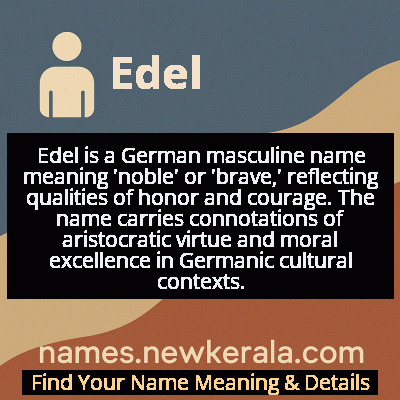Edel Name Meaning & Details
Origin, Popularity, Numerology Analysis & Name Meaning of Edel
Discover the origin, meaning, and cultural significance of the name EDEL. Delve into its historical roots and explore the lasting impact it has had on communities and traditions.
Name
Edel
Gender
Male
Origin
German
Lucky Number
8
Meaning of the Name - Edel
Edel is a German masculine name meaning 'noble' or 'brave,' reflecting qualities of honor and courage. The name carries connotations of aristocratic virtue and moral excellence in Germanic cultural contexts.
Edel - Complete Numerology Analysis
Your Numerology Number
Based on Pythagorean Numerology System
Ruling Planet
Saturn
Positive Nature
Ambitious, efficient, realistic, and authoritative.
Negative Traits
Materialistic, stressed, confrontational, and can be overly ambitious.
Lucky Colours
Dark blue, black.
Lucky Days
Saturday.
Lucky Stones
Blue sapphire, amethyst.
Harmony Numbers
2, 4, 6.
Best Suited Professions
Business leaders, managers, financial services, law enforcement.
What People Like About You
Leadership, determination, organizational skills.
Famous People Named Edel
Edel Quinn
Catholic missionary
Renowned Legion of Mary envoy to East Africa, known for her courageous missionary work
Edel Hætta Eriksen
Sami teacher and cultural worker
Survived WWII concentration camps and became prominent advocate for Sami language and culture
Edel Rodriguez
Cuban-American artist and illustrator
Internationally recognized for bold political illustrations in TIME, Der Spiegel, and The New Yorker
Edel von Rothe
German nobleman and military officer
Distinguished cavalry officer in WWI and prominent figure in German aristocratic circles
Name Variations & International Equivalents
Click on blue names to explore their detailed meanings. Gray names with will be available soon.
Cultural & Historical Significance
During the 19th century German Romantic movement, names like Edel experienced renewed popularity as part of a broader cultural rediscovery of Germanic heritage and traditional values. The name carries connotations of purity, excellence, and moral integrity within German cultural contexts, often associated with the idealized virtues of knighthood and aristocratic responsibility that feature prominently in German literature and folklore. In contemporary German culture, while social nobility has diminished in importance, the concept of 'edel' as moral nobility remains culturally significant.
Extended Personality Analysis
Individuals named Edel are typically perceived as possessing strong moral character, integrity, and a natural sense of leadership. They often exhibit courage in facing challenges and maintain dignified composure even under pressure. The name suggests someone who values honor and principles, often demonstrating reliability and steadfastness in their commitments. These individuals tend to be thoughtful decision-makers who consider the ethical implications of their actions, showing particular strength in situations requiring moral courage.
Their noble bearing often inspires trust and respect from others, though they may sometimes be perceived as reserved or overly formal. Edels typically possess strong inner conviction and are not easily swayed from their chosen path once they've determined it to be right. They often excel in positions of responsibility where their natural authority and sense of duty can be fully expressed, while their bravery manifests not as recklessness but as calculated courage in service of higher principles. The combination of these traits typically results in individuals who are both respected leaders and trusted confidants.
Modern Usage & Popularity
In contemporary times, Edel remains a distinctive but relatively uncommon name in German-speaking countries, often chosen by parents seeking a traditional name with noble connotations. While it never reached the popularity peaks of more common German names, it maintains a steady presence, particularly among families with aristocratic backgrounds or those valuing traditional Germanic names. The name has seen slight resurgence in recent years as part of the broader trend toward vintage and meaningful names. In modern Germany and Austria, Edel is recognized as a classic masculine name that conveys strength, tradition, and cultural heritage without being overly common. Its usage extends beyond German-speaking regions through diaspora communities and among parents attracted to its strong, single-syllable structure and clear meaning. The name's relative rarity in modern times adds to its distinctive appeal for parents seeking unique yet meaningful names.
Symbolic & Spiritual Meanings
Symbolically, Edel represents nobility of character rather than mere social status, embodying the ideal of inner excellence and moral courage. The name carries metaphorical associations with purity, like precious metals refined through fire, suggesting someone who maintains integrity through life's challenges. It symbolizes the Germanic cultural ideal of the 'edler Mensch' (noble person) who combines strength with virtue and leadership with compassion. The name evokes images of ancient oaks—strong, deeply rooted, and enduring—representing stability and reliability. In symbolic terms, Edel suggests a person who acts as a moral compass for others, someone whose presence elevates those around them through example rather than command. The symbolic meaning extends to concepts of protection and guardianship, reflecting the historical role of nobility as defenders and stewards of their communities, while also representing the timeless human aspiration toward moral excellence and courageous integrity.

